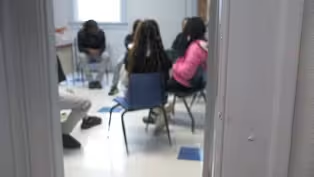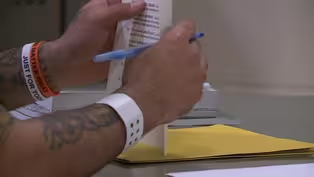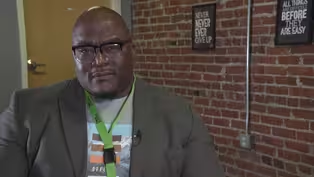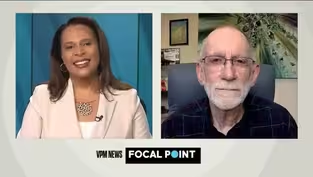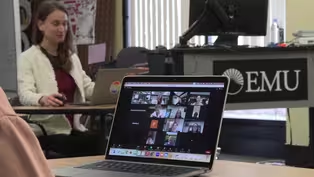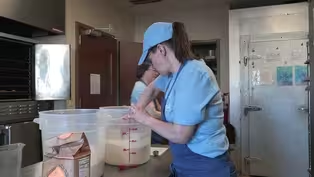VPM News Focal Point
Diversion courts are rooted in restorative justice
Clip: Season 3 Episode 8 | 3m 24sVideo has Closed Captions
Special dockets offer support for veterans and others to avoid jail time.
The first veterans treatment docket in Virginia was established in Fairfax in 2015, and since that time, there are eight additional courts. Fairfax also has drug and mental health treatment dockets—all meant to provide mentors and special services so that individuals can avoid jail and cure the issues that led to their issues with law enforcement.
Problems playing video? | Closed Captioning Feedback
Problems playing video? | Closed Captioning Feedback
VPM News Focal Point is a local public television program presented by VPM
The Estate of Mrs. Ann Lee Saunders Brown
VPM News Focal Point
Diversion courts are rooted in restorative justice
Clip: Season 3 Episode 8 | 3m 24sVideo has Closed Captions
The first veterans treatment docket in Virginia was established in Fairfax in 2015, and since that time, there are eight additional courts. Fairfax also has drug and mental health treatment dockets—all meant to provide mentors and special services so that individuals can avoid jail and cure the issues that led to their issues with law enforcement.
Problems playing video? | Closed Captioning Feedback
How to Watch VPM News Focal Point
VPM News Focal Point is available to stream on pbs.org and the free PBS App, available on iPhone, Apple TV, Android TV, Android smartphones, Amazon Fire TV, Amazon Fire Tablet, Roku, Samsung Smart TV, and Vizio.
Providing Support for PBS.org
Learn Moreabout PBS online sponsorshipRACHEL THORNSBERRY: I am a veteran of the US Army.
I joined in 2000 right out of high school as an 18-year-old kid, just wanting to go save the world.
And during my time, I experienced some trauma from my peers.
At the time, I didn't realize that that trauma would eventually be a ticking time bomb and what that would mean for me.
And there's so many other people that experience those traumas, people that fight for our country that see things that other people don't see.
So when I graduated from the Veterans docket in Spotsylvania, it was super important for my whole life because it was important to me to prove to not just myself, but everybody else, that this recovery road is possible.
It is fair to say that the program did save my life.
I am here sitting here talking to you today because of that choice.
STEVE DESCANO: A diversion court is, it's a problem solving court.
It's not adversarial.
It does take place in a courtroom, but it is all about all the sides, all the parties working together to try to get at the root cause of why somebody has touched our justice system and everybody working together to help that person, not punish them so that they can become the member of our community that they want to be.
We have a veteran treatment docket court.
We have a mental health court, and then we have a drug court.
We live here in Fairfax County in a community with roughly 70,000 veterans.
Veterans understand what what other veterans go through and that comradery, they want to help these individuals.
That really was a big driving force here in Fairfax.
But like anything else, once you see it working, once you see it being effective, you want to spread it out to many other people.
We in the justice system can do better.
We know that we put more people in jail and prison than any other country in the world, and yet we're not the safest country in the world.
If you really care about community safety and you really care about helping people, then you start to look at alternatives.
Our Veterans Court docket has a lot of veteran mentors and the interactions with those veteran mentors who are just volunteers who really care about their fellow veterans is really, really important in terms of keeping up with those individuals and making sure that you're on track.
There is this misunderstanding that these types of programs are somehow soft on crime, when in reality they're smart on crime.
These programs don't exist out of the goodness of people's hearts.
They exist because they work.
They help individuals lower their recidivism rate.
It creates lower crime going forward.
I've gone to a lot of these graduations and heard their stories and just the way that these individuals talk about themselves from before they were in the program to when they are now and graduated, they are so happy with where they are at, that they're such a better version of the person that they were.
It's really inspiring.
RACHEL THORNSBERRY: I am a senior at Liberty University.
I never thought that I would be able to go to college.
I have two semesters left until I graduate.
I'll have my bachelor's in social work.
I run a ministry called Help Along the Way, we help individuals who are getting out of jail, prison, people entering the recovery community, and that's really where the best feeling of accomplishment comes from, is reaching back and bringing the next person that was behind you.
It makes me so happy to see all these different counties stepping up, providing these programs.
I couldn't be happier seeing that because everybody deserves to go through a program.
Everybody deserves that help.
Lynchburg City Schools work to curb suspensions using restorative practices
Video has Closed Captions
Clip: S3 Ep8 | 3m 48s | School districts throughout the nation are shifting towards restorative justice. (3m 48s)
Reincarceration in the Commonwealth
Video has Closed Captions
Clip: S3 Ep8 | 3m 53s | A local jail is combating recidivism with a program that aims to rehabilitate inmates. (3m 53s)
Restorative justice in Virginia
Video has Closed Captions
Clip: S3 Ep8 | 7m 32s | How agencies find alternatives to punishment in the Commonwealth. (7m 32s)
Restorative justice’s Indigenous roots
Video has Closed Captions
Clip: S3 Ep8 | 7m 47s | Howard Zehr on his role in restorative justice movements and the philosophies’ indigenous roots. (7m 47s)
Restorative justice’s ties to Mennonite faith
Video has Closed Captions
Clip: S3 Ep8 | 3m 48s | Big criminal justice reform ideas are from a small campus in Virginia’s Blue Ridge Mountains. (3m 48s)
Video has Closed Captions
Clip: S3 Ep8 | 3m 38s | A Roanoke restorative program kneads change through breadmaking. (3m 38s)
Providing Support for PBS.org
Learn Moreabout PBS online sponsorship
- News and Public Affairs

Top journalists deliver compelling original analysis of the hour's headlines.

- News and Public Affairs

FRONTLINE is investigative journalism that questions, explains and changes our world.












Support for PBS provided by:
VPM News Focal Point is a local public television program presented by VPM
The Estate of Mrs. Ann Lee Saunders Brown
